Second homes in Wales: Call to boost 'paltry solution'
The Welsh government has been accused of offering a "paltry solution" to the second homes crisis in Wales.
Ministers have promised £11m to buy and refurbish homes in the most affected parts of Wales.
But Dyfodol i'r Iaith, a Welsh language campaign group, says the government's offer "roughly equates to buying or building 44 homes."
Welsh government said "no one silver bullet" can tackle the matter and it is introducing a "suite" of measures.
Dyfodol i'r Iaith said £200m should be earmarked for building or buying 800 homes to respond to the housing needs on the west coast of Wales.
It has also emerged that the Welsh government is yet to recruit two officials to support a pilot, launched this month, to look at the issue in the Dwyfor area of Gwynedd, which stretches from the Llyn Peninsula to the area west of Porthmadog.
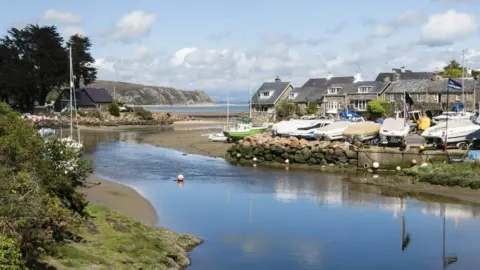 Getty Images
Getty ImagesRhys Tudur, leader of Nefyn Town Council and a member of the local housing campaign group Hawl i Fyw Adra, said the pilot was "painfully slow" and that it was "still very uncertain what's included in the pilot itself. And while things are moving slowly, more homes are leaving local hands".
He also called on the Welsh government to provide more money to tackle the housing crisis, criticising the £1m promised for buying and renovating houses specifically within the pilot area, by the Welsh minister Julie James in November.
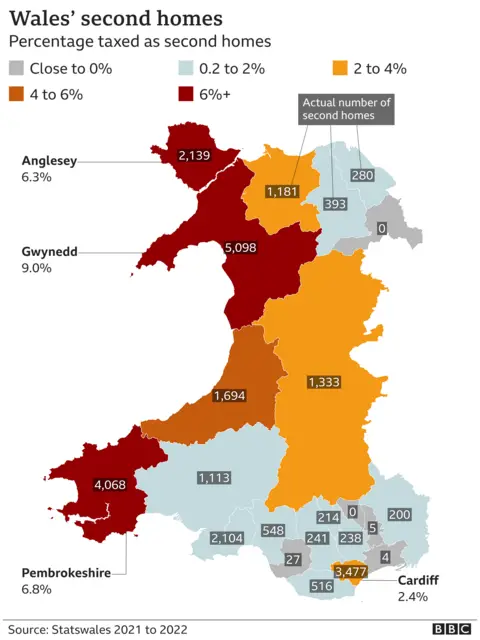

"Significant sums of money are required. A million pounds for the pilot area won't make any sort of difference," Mr Tudur said.
"It is paltry at the moment how much the Welsh government is willing to earmark for this."

What do people in the Dwyfor area think?
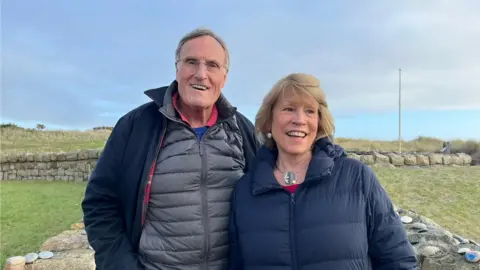
Charles and Liz Evans, who are from Bristol and have a holiday home in Aberdaron, said they empathised with those who were struggling to get on the housing ladder.
Liz Evans' mother bought the home in Aberdaron in the 1940s, where she grew up.
Mr Evans said: "We see why locals are angry that prices are sky high and locals can't get anywhere near it.
"On the other hand I don't think holiday homes should be banned, we need some type of compromise."
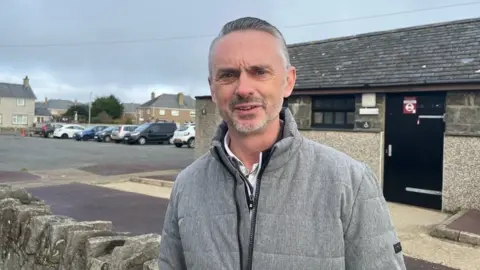
Mark Jones, from Pwllheli, said it was a "massive problem".
His 23-year-old daughter still lives at home and he said he worries about whether she'll be able to get on the ladder.
"I think there needs to be a better infrastructure in terms of getting affordable homes - whether that is through the local authority - but I do think we need help from Cardiff, the Senedd."

Most of the second homes registered for council tax in Wales are in the north west county of Gwynedd - 5,098 - followed by 4,068 in Pembrokeshire and 2,139 in Anglesey.
The Welsh government plans to make £11m available to buy and refurbish empty homes within the Dwyfor pilot area and more broadly in Gwynedd, Anglesey, Ceredigion, Carmarthenshire and Pembrokeshire.
But Dyfodol i'r Iaith called for more substantial and urgent action.
The group is calling on the Welsh government to earmark £200m to be mainly spent "within the west where the housing crisis is at its worst", which could "allow for 800 homes to be bought or built".
It said those houses could "respond to local needs" with the option of part-ownership and as holiday-let properties in public ownership - the profits of which could go to subsidise local housing or developing infrastructure of benefit to those communities.
The group is calling on the Welsh government to "urgently commission a study regarding the potential and practical obligations of the scheme" to be published by Easter.
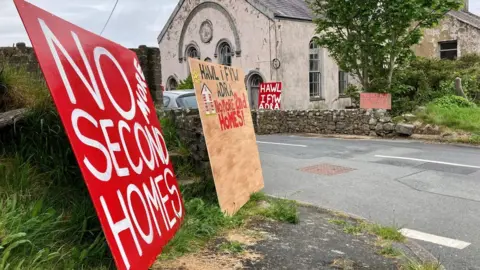
A Welsh government spokesperson said ministers had committed to delivering 20,000 "low carbon, good quality social homes for rent across Wales over the next five years".
"In addition to this, we have committed an extra £5m, taking the total to £11m this financial year alone, to the local authorities whose communities are impacted by second home ownership and holiday lets so they can buy and renovate empty homes."
It added: "This is a complex issue that no one silver bullet can solve, which is why we are introducing a suite of measurements to see which interventions will be most effective in maintaining the vibrancy of Wales' communities."
In November, the cooperation agreement between Labour and Plaid Cymru promised "immediate and radical action to address the proliferation of second homes".
The Welsh government's second homes plan, announced a day later, promised a two-phase approach to tackling problems caused by the issue in Wales.
The first phase included launching a pilot area and appointing two officials to support and develop plans in the area.
The second phase would involve a longer-term consultation on powers to limit the creation of second homes and holiday lets, and more local tax varying powers.
The first phase pilot, starting in January, covers Dwyfor.
At the time, the Welsh government said the pilot would "build on the practical support Welsh government is already providing to address affordability and availability of housing and will be tailored to suit the needs of people in the area".
It added that "two dedicated posts will support delivery of the pilot in the areas to link the interventions, engage with communities and maximise the impact".
Asked by BBC Wales why those posts had not yet been advertised, the Welsh government said it was working with "partners" towards "the recruitment of two priority posts and putting in place the necessary evaluation of the pilot".
